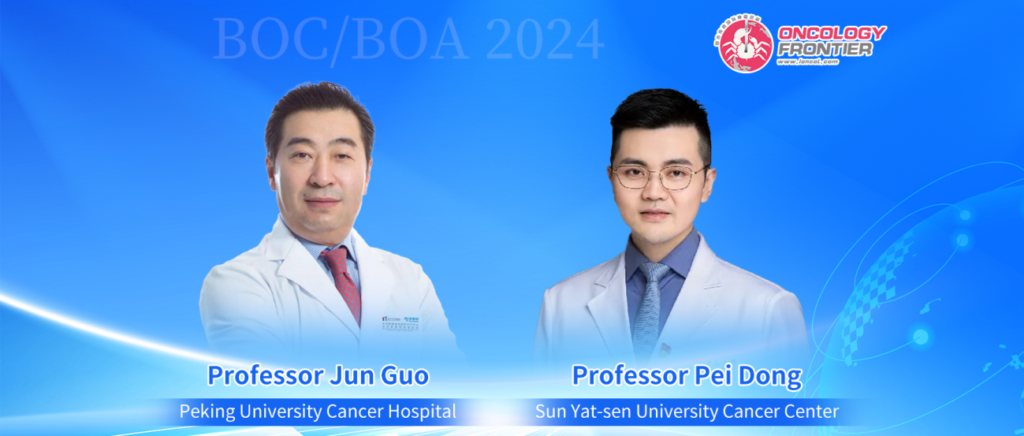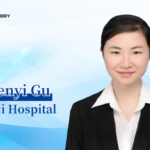
Editor's Note: From July 5-7, 2024, the 2024 Chinese Clinical Oncology Annual Progress Seminar (BOC) and Beast of ASCO® 2024 China were grandly held in Guangzhou. On the 6th, a special session on urinary system tumors convened, gathering significant progress from ASCO. In the field of kidney cancer treatment, besides international advancements, China has made significant strides in first-line and second-line treatments involving immunotherapy combinations and HIF-2α inhibitors, showcasing China’s cutting-edge scientific strength on the international stage. At this conference, "Oncology Frontier" invited Professor Jun Guo from Peking University Cancer Hospital to provide an overview of the current status and prospects of advanced kidney cancer treatment. Additionally, Professor Pei Dong from Sun Yat-sen University Cancer Center was interviewed to discuss the unmet clinical needs and cutting-edge developments in kidney cancer treatment domestically and internationally, and to grasp the trends in combination therapy for kidney cancer.An Overview of the Development and Prospects of Advanced Kidney Cancer Treatment
Professor Jun Guo: I am very pleased to discuss the recent advancements in kidney cancer at the BOC/BOA annual meeting. Currently, globally, targeted therapy and immunotherapy combinations (targeted-immunotherapy) remain the standard first-line treatment for metastatic kidney cancer, demonstrating overwhelming advantages in terms of objective response rate (ORR), progression-free survival (PFS), and overall survival (OS).
International experts have made numerous new attempts in first-line treatment for kidney cancer, while the unmet needs in second-line treatment remain a key research focus. At the 2023 ASCO, a study confirmed that cabozantinib combined with immunotherapy did not improve efficacy compared to cabozantinib monotherapy as a second-line treatment. Professor Laurence Albiges achieved a breakthrough with lenvatinib combined with an HIF-2α inhibitor as a second-line treatment, showing significantly better results than previous cabozantinib monotherapy studies. Additionally, an exploratory study on CM082 (vorolanib) combined with everolimus for second-line treatment after targeted-immunotherapy in China is ongoing and is expected to be a promising option.
Although current second-line results have not shaken the position of targeted-immunotherapy in the first line, it is a direction worth exploring in the future. Beyond the aforementioned studies, it is still unclear whether immunotherapy is ineffective in second-line treatment, as it may only be PD-1/L1 inhibitors that are ineffective. Many new immunotherapy drugs and anti-angiogenic drugs are still being tested in the third-line, second-line, and even first-line treatments for kidney cancer, with numerous studies in progress. Therefore, I believe that the future of kidney cancer treatment will see significant advancements, bringing a bright outlook.
Oncology Frontier: How do you evaluate the efficacy of the new kidney cancer treatment strategies shared by Sun Yat-sen University Cancer Center at this ASCO meeting, and what is their clinical significance?
Professor Pei Dong: For non-clear cell renal carcinoma, both domestic and international guidelines recommend participating in clinical research as the first-line choice due to many unmet clinical needs. Domestic institutions such as West China Hospital, Renji Hospital, and our center are actively exploring related treatments. At the 2024 ASCO meeting, our team presented phase II research data on anlotinib combined with sintilimab as first-line treatment for non-clear cell renal carcinoma, showing an overall ORR of 52.9% and a median PFS of 15.1 months, indicating the overall efficacy of targeted-immunotherapy for non-clear cell renal carcinoma. Due to the heterogeneity of this cancer, different subtypes respond differently to treatment, particularly in terms of immunotherapy efficacy. Therefore, individualized treatment is crucial to optimize treatment plans for different subtypes.
Research on treatment progress after first-line immunotherapy resistance is a hot topic, but many domestic patients still receive only targeted therapy as the first line, making second-line choices crucial. At the 2024 ASCO meeting, our team presented a study on camrelizumab combined with apatinib for patients progressing after first-line TKI treatment, showing an ORR of 34.3% and a median PFS of 10.0 months, indicating the advantage of targeted-immunotherapy as a second-line treatment for patients with resistance to targeted monotherapy. This study is ongoing, and we hope future data will bring more benefits.
In terms of individualized treatment, patients may experience different progression patterns. If comprehensive progression occurs, intensified treatment or switching drugs may yield better results. If oligometastasis or oligoprogression occurs after long-term disease control, resistance may not have developed yet. Our team has explored oligometastasis, and a poster at the 2024 ASCO meeting showed that for patients with oligoprogression after first-line treatment, combining stereotactic body radiotherapy (SBRT) with the original treatment plan achieved a local control rate of 97.1% and a median PFS of 15.0 months, hoping for further OS benefits in the future.
Professor Jun Guo
Chief Physician, Doctoral Supervisor, Professor Director of the Department of Melanoma and Sarcoma Oncology Director of the Department of Urological Oncology Vice President and Secretary General of the Chinese Society of Clinical Oncology (CSCO) Vice President of the International Melanoma Association (MWS) Chairman of the Melanoma and Skin Tumor Committee of the European Society for Medical Oncology (ESMO) Chairman of the Melanoma Committee of the National Cancer Center and National Tumor Quality Control Center Chairman of the CSCO Melanoma Expert Committee Vice Chairman of the CSCO Renal Cancer Expert Committee Vice Chairman of the CSCO Immunotherapy Expert Committee Vice Chairman of the CSCO Urothelial Cancer Expert Committee Vice Chairman of the CSCO Prostate Cancer Expert Committee Expert in National Drug Registration Review for CFDA Member of the National Health Commission’s Rational Drug Use Expert Committee (Anti-tumor Drug Specialty Group)
Professor Pei Dong Chief Professor of Kidney Cancer Associate Chief Physician, Master’s Supervisor Jointly Trained Doctor by Central South University and Harvard University Chief Professor at Sun Yat-sen University Cancer Center Deputy Leader of the Rare Kidney Cancer Collaboration Group of the Uro-Genital Tumor Committee of the Chinese Anti-Cancer Association Secretary and Editor of the CSCO Kidney Cancer Guidelines (2022-2023) Standing Committee Member of the Youth Committee of CSCO Standing Committee Member of the Integrated Chinese and Western Medicine Kidney Cancer Committee of the Chinese Anti-Cancer Association Vice Chairman of the Immunotherapy Branch of the Guangdong Provincial Health Association Member of the CSCO Kidney Cancer Expert Committee Member of the Uro-Genital Tumor Committee of the Guangdong Anti-Cancer Association Member of the Oncology Group of the Urology Branch of the Guangdong Medical Association Member of the Uro-Oncology Branch of the Guangdong Uro-Genital Association Editorial Board Member of JCO Chinese Edition and CA Chinese Edition Recognized as an Excellent Physician in Yangcheng; Recipient of the Jinshan Camellia Award – China’s Excellent Doctor Recognized as an Outstanding Urological MDT Physician Expert in comprehensive treatment of urological tumors, kidney cancer management, minimally invasive kidney-sparing treatment for complex kidney tumors, surgery and postoperative adjuvant treatment for high-risk kidney cancer, individualized multidisciplinary treatment for advanced metastatic kidney cancer, and surgical treatment of complex retroperitoneal tumors.


